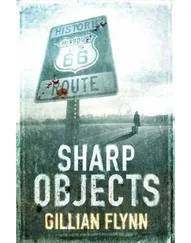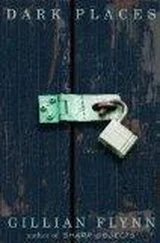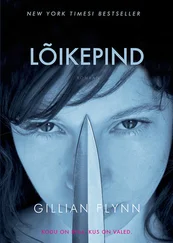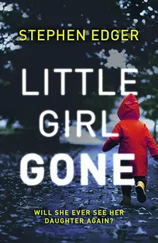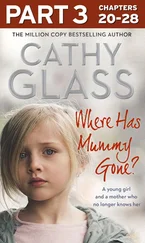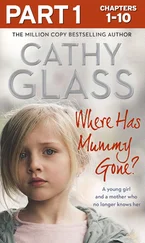“Oh. Oh my God,” Sharon said. When she turned back to me, she wasn’t smiling at all.
AMY ELLIOTT DUNNE
TEN DAYS GONE
I have made a call: to make a call. The meeting can’t happen until this evening—there are predictable complications—so I kill the day by primping and prepping.
I clean myself in a McDonald’s bathroom—green gel on wet paper towels—and change into a cheap, papery sundress. I think about what I’ll say. I am surprisingly eager. The shithole life was wearing on me: the communal washing machine with someone’s wet underwear always stuck in the rungs at the top, to be peeled out by hesitant pincered fingers; the corner of my cabin rug that was forever mysteriously damp; the dripping faucet in the bathroom.
At five o’clock, I begin driving north to the meeting spot, a river casino called Horseshoe Alley. It appears out of nowhere, a blinking neon clump in the middle of a scrawny forest. I roll in on fumes—a cliché I’ve never put to practice—park the car, and take in the view: a migration of the elderly, scuttling like broken insects on walkers and canes, jerking oxygen tanks toward the bright lights. Sliding in and out of the groups of octogenarians are hustling, overdressed boys who’ve watched too many Vegas movies and don’t know how poignant they are, trying to imitate Rat Pack cool in cheap suits in the Missouri woods.
I enter under a glowing billboard promoting—for two nights only—the reunion of a ’50s doo-wop group. Inside, the casino is frigid and close. The penny slots clink and clang, joyful electronic chirps that don’t match the dull, drooping faces of the people sitting in front of the machines, smoking cigarettes above dangling oxygen masks. Penny in penny in penny in penny in penny in ding-ding-ding! penny in penny in. The money that they waste goes to the underfunded public schools that their bored, blinking grandchildren attend. Penny in penny in. A group of wasted boys stumble past, a bachelor party, the boys’ lips wet from shots; they don’t even notice me, husky and Hamill-haired. They are talking about girls, get us some girls , but besides me, the only girls I see are golden. The boys will drink away their disappointment and try not to kill fellow motorists on the way home.
I wait in a pocket bar to the far left of the casino entrance, as planned, and watch the aged boy band sing to a large snowy-haired audience, snapping and clapping along, shuffling gnarled fingers through bowls of complimentary peanuts. The skeletal singers, withered beneath bedazzled tuxes, spin slowly, carefully, on replaced hips, the dance of the moribund.
The casino seemed like a good idea at first—right off the highway, filled with drunks and elderly, neither of whom are known for eyesight. But I am feeling crowded and fidgety, aware of the cameras in every corner, the doors that could snap shut.
I am about to leave when he ambles up.
“Amy.”
I’ve called devoted Desi to my aid (and abet). Desi, with whom I’ve never entirely lost touch, and who—despite what I’ve told Nick, my parents—doesn’t unnerve me in the slightest. Desi, another man along the Mississippi. I always knew he might come in handy. It’s good to have at least one man you can use for anything. Desi is a white-knight type. He loves troubled women. Over the years, after Wickshire, when we’d talk, I’d ask after his latest girlfriend, and no matter the girl, he would always say: “Oh, she’s not doing very well, unfortunately.” But I know it is fortunate for Desi—the eating disorders, the painkiller addictions, the crippling depressions. He is never happier than when he’s at a bedside. Not in bed, just perched nearby with broth and juice and a gently starched voice. Poor darling .
Now he is here, dashing in a white midsummer suit (Desi changes wardrobes monthly—what was appropriate for June would not work for July—I’ve always admired the discipline, the precision of the Collings’s costuming). He looks good. I don’t. I am too aware of my humid glasses, the extra roll of flesh at my waist.
“Amy.” He touches my cheek, then pulls me in for an embrace. Not a hug, Desi doesn’t hug, it’s more like being encased by something tailored just to you. “Sweetheart. You can’t imagine. That call. I thought I’d gone insane. I thought I was making you up! I’d daydreamed about it, that somehow you were alive, and then. That call. Are you okay?”
“I am now,” I say. “I feel safe now. It’s been awful.” And then I burst into tears, actual tears, which hadn’t been the plan, but they feel so relieving, and they fit the moment so perfectly, that I let myself unravel entirely. The stress drips off me: the nerve of enacting the plan, the fear of being caught, the loss of my money, the betrayal, the manhandling, the pure wildness of being on my own for the first time in my life.
I look quite pretty after a cry of about two minutes—longer than that and the nose goes runny, the puffiness sets in, but up to that, my lips gets fuller, my eyes bigger, my cheeks flushed. I count as I cry into Desi’s crisp shoulder, one Mississippi, two Mississippi —that river again—and I curb the tears at one minute and forty-eight seconds.
“I’m sorry I couldn’t get here earlier, sweetheart,” Desi says.
“I know how full Jacqueline keeps your schedule,” I demur. Desi’s mom is a touchy subject in our relationship.
He studies me. “You look very … different,” he says. “So full in the face, especially. And your poor hair is—” he catches himself. “Amy. I just never thought I could be so grateful for anything. Tell me what’s happened.”
I tell a Gothic tale of possessiveness and rage, of Midwest steak-and-potato brutality, barefoot pregnancy, animalistic dominance. Of rape and pills and liquor and fists. Pointed cowboy boots in the ribs, fear and betrayal, parental apathy, isolation, and Nick’s final telling words: “You can never leave me. I will kill you. I will find you no matter what. You are mine.”
How I had to disappear for my own safety and the safety of my unborn child, and how I needed Desi’s help. My savior. My story would satisfy Desi’s craving for ruined women—I was now the most damaged of them all. Long ago, back in boarding school, I’d told him about my father’s nightly visits to my bedroom, me in a ruffly pink nightgown, staring at the ceiling until he was done. Desi has loved me ever since the lie, I know he pictures making love to me, how gentle and reassuring he would be as he plunged into me, stroking my hair. I know he pictures me crying softly as I give myself to him.
“I can’t ever go back to my old life, Desi. Nick will kill me. I’ll never feel safe. But I can’t let him go to prison. I just wanted to disappear. I didn’t realize the police would think he did it.”
I glance prettily toward the band onstage, where a skeletal septuagenarian is singing about love. Not far from our table, a straight-backed guy with a trim mustache tosses his cup toward a trash can near us and bricks (a term I learned from Nick). I wish I’d picked a more picturesque spot. And now the guy is looking at me, tilting his head toward the side, in exaggerated confusion. If he were a cartoon, he’d scratch his head, and it would make a rubbery wiik-wiik sound. For some reason, I think: He looks like a cop . I turn my back to him.
“Nick is the last thing for you to worry about,” Desi said. “Give that worry to me and I’ll take care of it.” He holds out his hand, an old gesture. He is my worry-keeper; it is a ritual game we played as teens. I pretend to place something in his palm and he closes his fingers over it and I actually feel better.
Читать дальше

